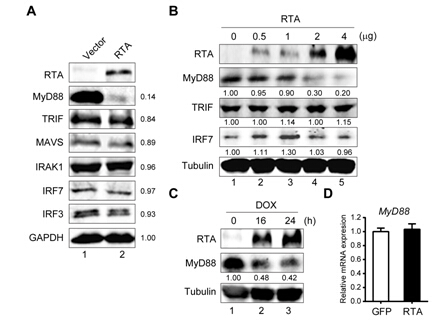On October 15, 2014, the International academic Journal of Virology published an article online entitled “Kaposi's Sarcoma-Associated Herpesvirus-Encoded RTA Impairs Innate Immunity via Ubiquitin-mediated Degradation of MyD88” by Prof. Ke Lan’s Lab at Institut Pasteur of Shanghai, Chinese Academy of Sciences.
Kaposi’s Sarcoma-Associated Herpesvirus (KSHV), one of the human tumor viruses, is closely related to the development of Kaposi’s sarcoma (KS), primary effusion lymphoma (PEL) and multicentric Castleman’s diseases (MCD). As with other herpesvirus, KSHV undergoes latency and lytic reactivation life cycles. KSHV ORF50 encoded RTA is the switch protein of viral lytic replication. Moreover, as a tegument protein, RTA is packaged into KSHV virions and is released into host cells soon after KSHV infection, which helps to inhibit antiviral innate immunity and facilitate viral latency establishment.
To explore the functions and mechanisms of RTA in KSHV immune evasion, Ph.D. student Qinglan Zhao discovered that RTA down-regulates the expression of MyD88, one of the critical mediators in innate immunity at the protein level by degrading MyD88 through the ubiquitin (Ub)-proteasome pathway under supervision of Prof. Ke Lan. They verified the interaction between RTA and MyD88 in vitro and in vivo and demonstrated that RTA functions as an E3 ligase to MyD88. Moreover, they found that MyD88 was repressed at the early stage of de novo KSHV infection as well as in lytic reactivation. They also found that RTA inhibited lipopolysaccharide (LPS)-triggered activation of the TLR4 pathway by reducing IFNs production and NF-κB activity. Finally, they showed that MyD88 promoted the production of IFNs and inhibited KSHV LANA gene transcription. Taken together, their results suggest that KSHV RTA facilitates the virus to evade innate immunity through degradation of MyD88, which might be critical for viral latency control.
The study was supported by the Key Project of Natural Science Foundation of China.
link:http://www.ncbi.nlm.nih.gov/pubmed/25320320

Figure:RTA reduces MyD88 protein level

